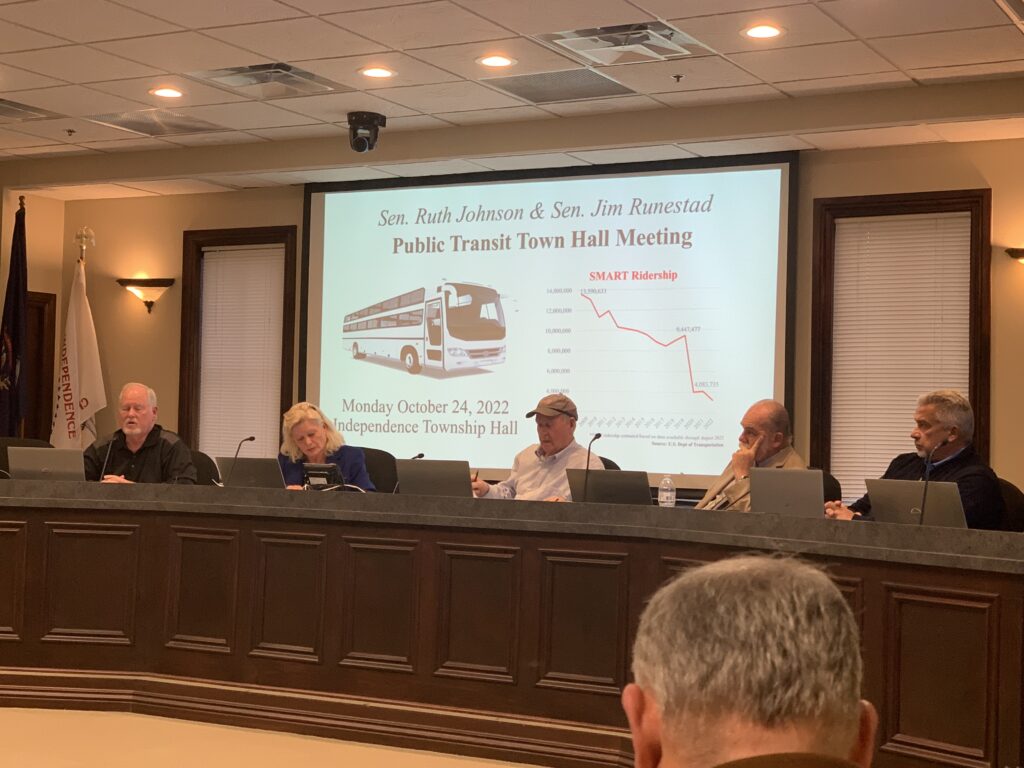
By Matt Mackinder
Special to the Oxford Leader
Independence Township – The Township Hall board room was nearly full with curious individuals from various Oakland County communities Oct. 24 for a 90-minute town hall forum to dicsuss the upcoming county public transit millage proposal on the Nov. 8 ballot.
The event was hosted by State Senators Jim Runestad and Ruth Johnson, while the panel was comprised of former SMART board member Jerry Poisson, County Commissioner Bob Hoffman, Holly Township Supervisor George Kullis, and Rob Guzanek, an Addison Township resident.
Essentially, the proposal is that Oakland County residents will vote on a 10-year transit millage that will be 0.95 mills per $1,000 in a home’s taxable value, with the average cost to residents $166.
The millage looks to expand bus service throughout the county and is expected to generate $66 million in the first year – $37.9 million to maintain the current bus system, $20.4 million to improve and expand the transit system, $7.8 million for capital improvements with Oakland County getting $800,000 in administrative costs. If the millage passes, only the communities that have opted in would benefit with those that have not also footing their share of the bill.
“Most surprising to me were comments from officials expressing frustration for not even being consulted by (Oakland County Board Chairman) David Woodward about the transportation needs of residents in their district or township,” said Oxford resident Jay Taylor. “Other panel members expressed frustration that decades-long local control provisions were being abandoned that allowing townships the ability to opt-out was being canceled, and that invitations for Chair Woodward to attend local information meetings were simply ignored. Further, tax limitations in the Michigan Constitution were circumvented by creating a county transit authority to levy taxes.
“I laughed when Commissioner Hoffman described this transit proposal as ‘bad government on steroids,’ but I agree. In my 30 years living in Oakland County, I’ve never seen such disregard at the county level by one political party toward the other, nor the indifference to drowning lower-income and senior residents such as myself with excessive taxes for unneeded projects.
“Have you once seen a packed bus in Oakland County? Do we need to spend more?”
Runestad noted that SMART ridership has been on the decline, even pre-COVID, saying that the number of riders per year was 13.3 million in 2008 to 9.4 million rides in 2019. During the pandemic, those numbers plummeted even more to four million in 2020 and just less than 4.1 million in 2021.
“Given all this, despite a 57 percent decrease in service, the transit agency spent an additional $3 million to add to their $1.37 million budget last year,” said Runestad. “According to the most recent data from 2020 released by the U.S. Census Bureau, only 0.4 percent of Oakland County riders relied on public transportation to get to their jobs. That’s 2,500 people out of a polulation of 1.3 million.
“While buses run near-empty, taxpayers who do not benefit pay the bill. Last year, your tax dollars paid for 98.9 percent of SMART’s operating budget. Only 1.1 percent was paid by fares covered by the riders.”
At the town hall, a map of proposed bus routes was shown with very little going to northern Oakland County. In addition, should the millage pass, those northern residents that go to Genesee County via public transit for medical care would no longer be able to take the bus to their appointments.
Kullis and Hoffman said Woodward and Oakland County Executive David Coulter are pushing this “11th-hour” proposal on to residents. Hoffman explained that Woodward gave elected commissioners just six days to consider placing the proposal on the ballot before a special meeting.
They also noted that despite lacking any study showing a need for these additional services or a plan for how commissioners would spend the money, the proposal was added to the Nov. 8 ballot.
“I asked (Woodward) what his Plan B is and he said there isn’t one because he is sure the proposal will pass,” Johnson said.
Guzanek said that with $66 million, the county could better spend that money on other county initiatives.
“We’ve got more pressing problems, fixing our infrastructure and fixing our communication problems before we start worrying about bus routes,” said Guzanek.
“Our job as voters and taxpayers is to hold the elected officials’ feet to the fire,” Kullis said. “Once you identify the problem and once you identify the plan, once you’ve done that, I want to see the cost of the plan, and I have a right to know how you’re going to spend my money. On a local basis, I’m a local, elected official. Every one of my constituents knows exactly where my house is and they don’t hesitate to pull into my front yard and call me and ask me to explain things. They catch me in the grocery story and they catch me walking down the street. I’m out there. It’s different when you go up the chain and when you get to the state legislature, we don’t know where anybody lives and we can’t go ask anybody.
“As voters, our job is to hold your feet to the fire and I want to see how you’re spending the money. That’s not what’s happening here.”

Leave a Reply